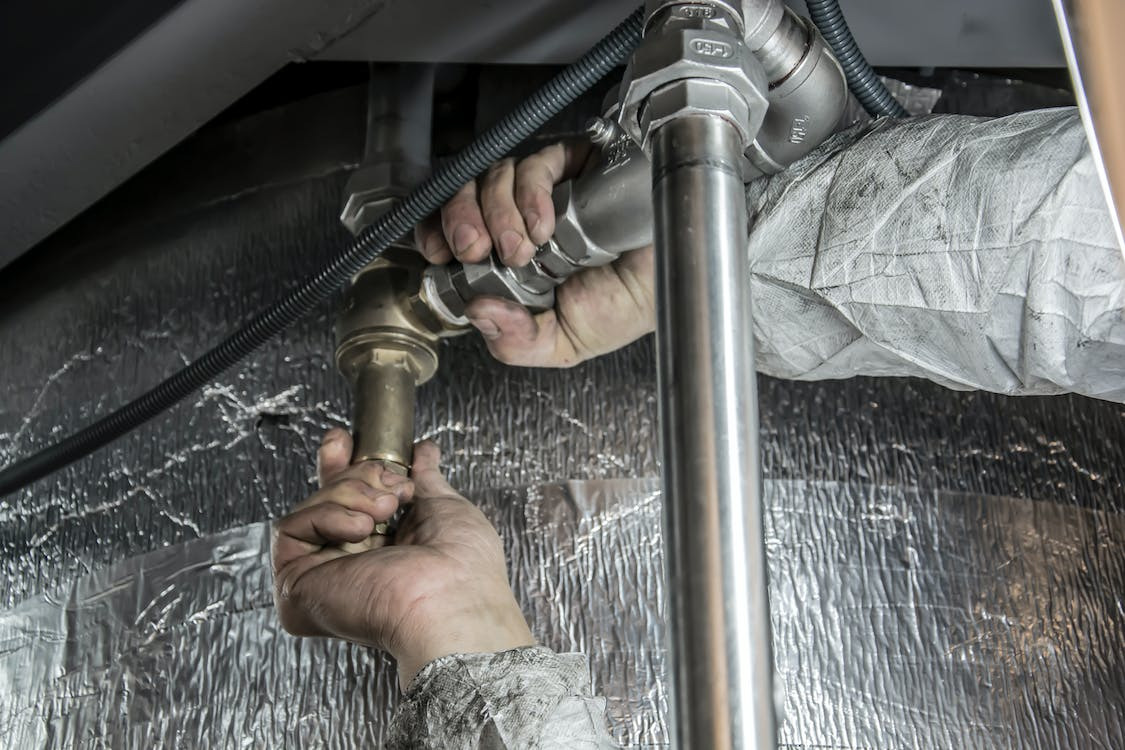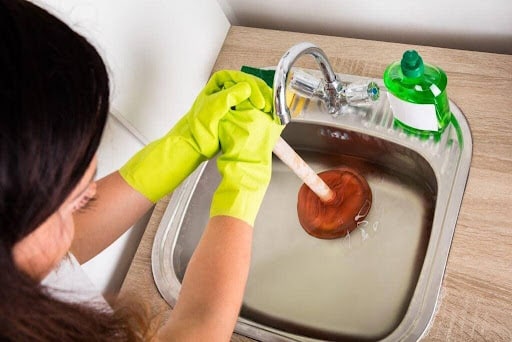Plumbing problems are one of the most irritating problems to have in your home. From causing unpleasant odors in your bathrooms and kitchen to continuous leakage, plumbing issues open up a Pandora’s box of problems.One major issue that plumbing problems is kitchen sink leak, for instance, can cause is mold. Yes, mold, the ever-present culprit that creeps its way into your space and opens up a can of worms you never expected before.
But why though? Or better yet, how would any plumbing problems give rise to mold in your home? Well, there are a number of reasons. So, let’s not waste any time and explore the 11 plumbing problems that can cause mold in your home.
Table of Contents
What Can Cause Plumbing Problems Like Blocked Drains?
Before we find out why or how plumbing problems can cause mold, let’s explore what causes the problems in plumbing in the first place.
Now don’t go tinkering with these all by yourself. I highly recommend that you take advice from a professional before attempting to unclog blocked drains.
You might inadvertently cause damage to the plumbing system.
Finding the source of the problem in the system should always be your first priority. Only then will you be able consult solutions for your specific plumbing problems.
But it’s always good to know the probable causes in general.
Let’s dive into these.
- Age and Wear of Faucet: Over time, pipes, fixtures, and other plumbing components get damaged due to regular use, exposure to water, and harsh chemicals. This can lead to leaks, cracks, and other issues, which is why you need to remove old kitchen faucet.
- Corrosion: Corrosion happens when metal pipes come into contact with chemicals or gunk that cause rust and rot. Corroded pipes can become and create leaks over time.
- Tree Roots: Tree roots seeking water sources can penetrate sewer lines, creating clogs, blockages, and damaging pipes. This causes slow drainage and sewage to back up.
- Clogs and Blockages: Hair, soap scum, food particles, grease, and other debris can clog drains and pipes. Not fixing blocked drains properly can cause more blockages and backups.
- Hard Water: Water with high mineral content, known as hard water, can lead to mineral buildup in pipes and fixtures, reducing water flow and creating blockages.
- Frozen Pipes: In cold weather, water can freeze inside pipes and expand, the pipes may then burst and leak when they thaw.
- High Water Pressure: Extremely high water pressure can make pipes, joints, and fixtures weak, causing leaks, bursts, and other problems.
- Improper Installation: Poor installation of plumbing parts, like pipes, joints, and fixtures, causes leaks, blockages, and other problems.
- Invasive Objects: Things like toys, toiletries, and other items accidentally flushed down toilets can back sewage up and block sewer lines.
- Grease Disposal: Pouring grease and oil down drains can lead to buildup and clogs in pipes over time.
- Deteriorated Seals and Gaskets: Seals and gaskets around fixtures can weaken and ruin over time, leading to leaks.
- Chemical Drain Cleaners: Harsh chemical drain cleaners corrode pipes and cause long-term damage. They can also make clogs worse by pushing debris further into the pipes.
- Excessive Use of Garbage Disposal: Disposing large amounts of food waste can clog and cause strain on the plumbing system.
- Flushing Inappropriate Items: Flushing sanitary products, wipes, cotton balls, and paper towels can block toilets and sewer lines.
- Sudden Temperature Changes: Rapid changes in water temperatures can weaken pipes and fixtures, causing leaks or bursts.
- Shifting Soil and Ground Movement: Ground movement due to earthquakes, settling soil, or heavy flooding can damage pipes and plumbing systems.
- Improper Maintenance: Not cleaning out gutters, ignoring leaks, or not servicing water heaters, can cause plumbing problems.
To reduce plumbing problems, it’s important to use and maintain plumbing parts properly, fix problems right away, and consider professional inspections and repairs when necessary.
Be sure to visit Inner City Plumbing to find out more about plumbing services.
11 Reasons That Can Cause Mold In Your Home
Plumbing problems can indeed lead to mold growth in homes thanks to the moisture they create. Below are some plumbing issues that can contribute to mold growth,
- Leaking Pipes
Leaky pipes, whether hidden within walls or under sinks, create a constant source of moisture. This damp environment is the perfect home for mold to grow and thrive.
- Leaking Roof or Foundation
Water leaks from the roof or foundation can seep into walls and floors without anybody knowing, creating conditions that promote mold growth. Attics, basements, and crawl spaces are especially vulnerable. Therefore, gutter installation is important to prevent rainwater from clogging the pipes.
- Faulty Plumbing Fixtures
Malfunctioning toilets, sinks, showers, or bathtubs that don’t drain properly can lead to standing water, which prompts mold growth if not fixed immediately.
- Clogged Drains
Slow or clogged drains can cause water to pool around the affected area. Mold can grow in and around this standing water if it isn’t cleaned urgently.
- Condensation and Poor Ventilation
Areas with poor ventilation, such as bathrooms and kitchens, can accumulate excessive moisture due to condensation. This moisture, if not properly ventilated, creates the perfect environment for mold growth.
- Sewer Backups
Sewer line backups can introduce contaminated water into your home, increasing the risk of mold growth due to organic matter and moisture being present.
- Burst or Frozen Pipes
Burst pipes release a large amount of water quickly, saturating surrounding materials and creating conditions where mold can grow. This is commonly found in outdoor faucets and drains. Frozen pipes can also burst, causing a similar problem once they thaw which is why you need to fix outdoor faucet to prevent the leak before the seasonal change.
- Improperly Sealed Joints
Poorly sealed joints in plumbing connections can lead to water leakage and hidden moisture buildup, which is a great breeding ground for mold.
- Excessive Humidity
High humidity levels in the home can be caused by improper ventilation, insufficient insulation, or even plumbing leaks, ultimately leading to a thriving growth of mold.
- Water Heater Leaks
Leaks from your water heater can go unnoticed for a long time, leading to the accumulation of moisture and mold growth in the surrounding areas.
- Dripping Faucets
Constant dripping from faucets or shower heads can create small pools of water, encouraging mold growth if not addressed right away.
Tips to Prevent Mold Caused By Plumbing Problems
- Check your plumbing system for leaks, blocks, and any other problems.
- You can opt for DIY gutter cleaning as well to avoid other plumbing issues like clogging of pipes.
- Consider professional plumbing to catch issues before they get worse.
- Fix any plumbing issues and blocked drains as soon as you catch them.
- Make sure there is ventilation in areas that retain moisture, like bathrooms, kitchens, and basements.
- Maintain consistent humidity indoors. Use dehumidifiers if you live in a very humid climate.
- Insulate pipes in colder areas of your home to prevent freezing or bursts.
- Clean and maintain your drains to prevent water from getting into your foundation.
FAQs
- What Are Some Health Problems Caused By Mold?
Ans: Mold can cause a lot of problems for your health, both physically and mentally. Respiratory problems like allergies, headaches, and more can be caused by mold.
- Is Mold Harmful For Aquarium Fishes?
Ans: Of course, mold is very harmful for aquarium fishes. If you see mold collecting on the top of the tank or water, clean it as soon as possible. Wear gloves and trash the cleaning tools properly after cleaning the mold out.
- Is Mold Contagious?
Ans: Mold is not infectious like cold or flu, but it can still be spread through cross-contamination. Bringing items or objects exposed to mold to your home risks contamination. You can also carry toxins on your clothes and hair from one place to another.
Conclusion
And there you have it! Plumbing issues can cause mold to grow in your home, which have negative effects on the health and overall well-being. So it’s crucial to make sure your home’s plumbing system is in tip-top shape.
Fix any potential issues quickly and, when necessary, hire professional plumbers to ensure proper repairs. After all, your health and comfort depend on it!





